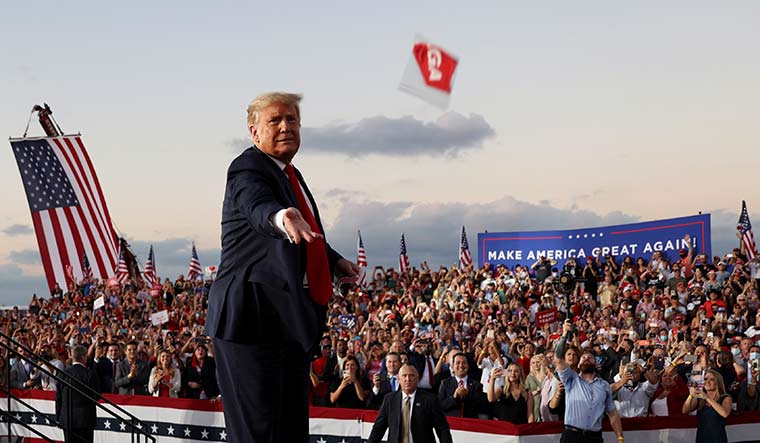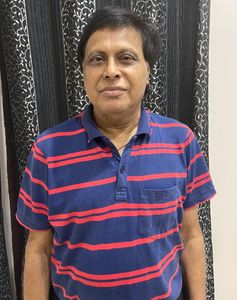Even as Covid-19 wreaks havoc across the world, scientists are starting to see a glimmer of light at the end of the tunnel. One of the new rays of hope is monoclonal antibody therapy, wherein artificially created antibodies are injected into the patient’s vein. Though expensive—a shot costs around 060,000—the treatment has reportedly been effective for patients with mild or moderate symptoms, provided it is administered within one week of the infection.
“These antibodies bind to the virus and do not allow it to attach to the body cells and thus slow down the disease progression,” says Dr Ravindra Mehta, chief pulmonologist, Apollo Hospitals, Bengaluru.
But does it work against the mutations? Researchers at the Asian Institute of Gastroenterology (AIG) in Hyderabad say it is effective against the Delta variant. Trial volunteers infected with the Delta variant recovered from fever a day after being given a single-dose drug cocktail of monoclonal antibodies, says AIG chairman Dr Nageshwar Reddy.
That said, the new Delta Plus variant of Covid-19, formed due to a mutation in the Delta variant, is reportedly resistant to the therapy.
Over the past few weeks, there has been a lot of buzz around the new therapy in India. But is it worth the hype? Says Dr Sushila Kataria, senior director, internal medicine at Medanta: “Given early, it can significantly change the trajectory of the illness. It can ease the burden on hospitals and ensure other patients in hospitals get better care.’’
Suresh Kumar Trehan, 65, recovered from Covid-19 in four days after being treated with monoclonal antibody therapy at BLK Max Super Speciality Hospital in Delhi. “He became asymptomatic a day after monoclonal administration. Four days later, when he was tested before going to the cath lab, he tested negative,” says Dr Sandeep Nayar, senior director and head of the department, chest and respiratory diseases, BLK Max, Delhi.
What makes the antibody cocktail unique is that it is the first specific treatment meant only for Covid-19. The other methods of treatments in use, like remdesivir, are repurposed medications. Says Dr Hari Kishan Gonuguntla, consultant interventional pulmonologist at Yashoda Hospitals, Hyderabad: “During the first wave, all treatment strategies used during the early stages of Covid-19 proved of no benefit in reducing the severity of the disease and, thus, did not reduce hospitalisations. However, these molecules (like favipiravir, hydroxychloroquine, doxycycline, ivermectin) were used abundantly without good scientific evidence. In this context, the monoclonal antibody cocktail becomes a breakthrough treatment, as this is the only molecule till date proven to be effective when used in the early stages of Covid-19 as a preventive strategy. This is also backed up by a large body of scientific evidence from the phase III trials of this neutralising monoclonal antibody cocktail (REGN-COV2) which showed reduction in hospitalisation or death by 70 per cent in non-hospitalised patients.”
The antibody cocktail treatment currently available in India offers a combination of casirivimab and imdevimab. “They complement each other and work for different sites when they go inside,” says Nayar. “The patient does not even have to get admitted [for the treatment].”
The therapy was previously used to treat HIV and Ebola. It was given to former US President Donald Trump last year, and the FDA approved it for the treatment of mild to moderate Covid-19 for adults and children (above 12 years and over 40kg).
The Drugs Controller General of India granted emergency use authorisation for the therapy this May. “Since then, 16 of our patients have received it,” says Kataria. “Four patients had undergone the treatment earlier. They got the medicine from the US. None of these patients was hospitalised. They were monitored for an hour after the antibodies were administered to check for any reactions. They were then monitored remotely.”
Mohabbat Singh, the first person to get the treatment after the DCGI approval, is now hale and hearty. Singh, an 84-year-old from Chandigarh, was visiting his son in Gurugram when he started showing symptoms of Covid-19. “He was given the cocktail and he recovered in one week,” says Kataria. Singh, an asthmatic, sought care soon after he was diagnosed with Covid-19. “The therapy is not effective beyond ten days of illness and to those who are already on oxygen treatment,” says Kataria.
Reportedly, none of the patients treated with monoclonal antibodies at Medanta has had any side effects. “Theoretically, they can have nausea, vomiting, skin rash and allergies. In a study of 18,000 patients, only one had allergic reactions severe enough to stop the treatment,” says Kataria.
A 58-year-old patient weighing 135kg was the first to receive the treatment at Mumbai’s Nanavati Hospital. He tested positive on May 30. A chronic smoker, he had a history of obstructive sleep apnoea. Despite multiple health problems, he recovered in two weeks.
Antibody cocktail treatment has been a lifesaver for many, especially those with comorbidities. Rohit Ghatak would vouch for that. His world turned upside down when his father, 70-year-old Sunirmal, tested positive for Covid-19 as he was preparing for his angiography at BLK hospital. “Considering his health, the doctor suggested he get monoclonal antibody treatment before the procedure,” says Rohit, who works with an online travel portal. Three days later, he tested negative for Covid-19.
The treatment also offers much hope to transplant patients suffering from Covid-19. When researchers at the Mayo Clinic in Minnesota screened transplant patients with mild to moderate Covid-19 and provided monoclonal antibodies early, the results were promising. “The outcomes of the first 73 treated patients were favourable, with low rate of hospitalisation and ICU admissions,” Raymund R. Razonable, vice chair of the infectious diseases division at the Mayo Clinic, tells THE WEEK. “No patients died. Transplant patients are vulnerable to severe infections, including Covid-19, because their ability to develop immune response against the virus is impaired. Spike monoclonal antibodies provide temporary protection that helps them get through Covid-19.”
Both the antibody cocktail and steroids cut the risk of death from Covid-19. However, steroids are more of a reactive treatment, says Kataria. “Steroids are effective in the later stages of the disease,” she says. “They are used to rectify what has gone wrong. By then, whatever the course the disease has to take, it takes. Monoclonal antibodies, on the other hand, can prevent disease progression from the inception of the infection.”
Though still in its early days, the cocktail has given some much-needed hope, and various Indian cities are now using antibodies as an antidote for Covid-19.




